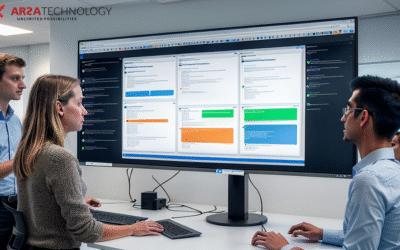Introduction: Overcoming Medical Record Data Entry Errors in the Healthcare Industry
In the fast-paced world of healthcare, accurate and timely documentation is not just a regulatory requirement; it’s a cornerstone of patient safety and operational efficiency. Yet, medical record data entry errors remain a pervasive and costly challenge. These inaccuracies can lead to misdiagnoses, delayed treatments, compliance penalties, and significant financial drain on healthcare systems. The traditional methods of manual data entry or even human transcription services are often slow, prone to human error, and consume valuable clinician time that could be better spent on patient care.
Forward-thinking healthcare organizations are actively seeking innovative solutions to this critical pain point. The answer lies in leveraging advanced artificial intelligence, specifically Speech-to-Text (STT) API technology. By transforming spoken words into precise, structured text, STT APIs offer a powerful pathway to streamline documentation, reduce errors, and unlock substantial return on investment (ROI). This article delves into a comprehensive cost-benefit analysis, demonstrating how ARSA Technology’s Speech-to-Text API can revolutionize voice note transcription for productivity apps, ensuring accuracy and efficiency in healthcare.
The Hidden Costs of Manual Data Entry in Healthcare
The impact of medical record data entry errors extends far beyond simple administrative inconvenience. These errors carry a heavy burden, both financially and in terms of patient outcomes. Consider the multifaceted costs:
- Clinician Burnout and Reduced Productivity: Doctors, nurses, and other medical professionals spend an inordinate amount of time on administrative tasks, including manual charting and note-taking. This diverts their attention from patients, contributes to burnout, and limits the number of patients they can see, directly impacting revenue potential.
- Financial Losses from Errors: Incorrect billing codes, denied claims, and rework required to correct erroneous entries lead to significant financial losses. Furthermore, the legal ramifications of medical errors stemming from poor documentation can result in costly lawsuits and reputational damage.
- Compromised Patient Safety: Perhaps the most critical consequence, data entry errors can directly jeopardize patient safety. Misrecorded allergies, incorrect dosages, or incomplete medical histories can lead to adverse drug events, inappropriate treatments, and even fatalities.
- Compliance Risks and Penalties: Healthcare organizations operate under stringent regulatory frameworks like HIPAA. Inaccurate or incomplete records can lead to non-compliance, resulting in hefty fines and increased scrutiny from regulatory bodies.
- Inefficient Workflows: The time spent on manual transcription, review, and correction creates bottlenecks in clinical workflows, slowing down patient throughput and overall operational efficiency.
These hidden costs underscore an urgent need for a solution that not only automates documentation but also enhances its accuracy and reliability.
Transforming Clinical Workflows with Voice Note Transcription
The integration of voice note transcription, powered by a robust Speech-to-Text API, offers a paradigm shift for healthcare documentation. Clinicians can simply speak their observations, diagnoses, and treatment plans, and the API instantly converts these voice notes into text. This seamless process dramatically improves several aspects of clinical workflows:
- Faster Documentation: Dictating notes is significantly quicker than typing or handwriting. This frees up valuable time for clinicians, allowing them to focus more on patient interaction and care rather than administrative burdens.
- Reduced Cognitive Load: By offloading the transcription process to AI, clinicians can maintain their focus during patient encounters, leading to more comprehensive and accurate initial observations.
- Improved Accuracy: Direct speech capture minimizes the chances of errors that can occur during manual transcription or interpretation of handwritten notes. Advanced STT APIs are trained to recognize medical terminology, further enhancing precision.
- Enhanced Patient Care: With less time spent on documentation, clinicians can dedicate more face-to-face time with patients, fostering stronger relationships and improving the quality of care.
- Integration with Productivity Apps: The flexibility of an API allows for easy integration into existing electronic health record (EHR) systems, mobile clinical apps, and other productivity tools, ensuring a smooth transition without disrupting established workflows.
ARSA Technology’s Speech-to-Text API: A Solution Built for Healthcare Demands
ARSA Technology understands the unique challenges and stringent requirements of the healthcare sector. Our Speech-to-Text API is engineered to meet these demands, offering a high-performance, secure, and scalable solution for medical transcription.
Key capabilities that make ARSA Technology’s API ideal for healthcare:
- Exceptional Accuracy: Leveraging advanced AI models, our highly accurate transcription API is trained to accurately recognize complex medical terminology, drug names, and anatomical terms, even amidst varied accents and background noise commonly found in clinical environments.
- Multilingual Support: In a globally diverse healthcare landscape, the ability to transcribe multiple languages is crucial. Our API supports a wide array of languages, enabling seamless documentation for diverse patient populations and international medical teams.
- Scalability for Enterprise Use: Whether you’re a small clinic or a large hospital network, our API scales effortlessly to handle high volumes of voice data, ensuring consistent performance as your needs grow.
- Robust Security and Privacy: We prioritize data security, designing our API with enterprise-grade security protocols to protect sensitive patient information, aligning with healthcare privacy standards.
To see the API in action and understand its capabilities firsthand, you can demo the Speech-to-Text API. This interactive experience allows you to explore how easily spoken words can be converted into precise text.
Quantifying the Return on Investment (ROI): A Cost-Benefit Analysis
Implementing ARSA Technology’s Speech-to-Text API in your healthcare operations translates into measurable ROI through both direct cost savings and significant improvements in operational and patient outcomes.
Direct Cost Savings:
- Reduced Transcription Costs: Eliminate or significantly reduce reliance on expensive manual transcription services or in-house transcription staff. The API offers a cost-effective, per-use model that scales with demand.
- Increased Clinician Productivity: By saving hours on documentation daily, clinicians can see more patients, leading to increased revenue generation for the facility. Even a modest increase in patient visits per day can result in substantial financial gains over time.
- Fewer Error-Related Reworks: Automated, accurate transcription drastically cuts down the time and resources spent on correcting medical record errors, including administrative time, legal reviews, and re-submission of claims.
- Avoidance of Compliance Fines: Improved documentation accuracy and completeness reduce the risk of non-compliance with regulatory bodies, thereby avoiding potentially massive fines and legal expenses.
Improved Outcomes and Strategic Advantages:
- Enhanced Patient Safety: Accurate and timely medical records directly contribute to better diagnostic decisions and treatment plans, significantly improving patient safety and reducing adverse events.
- Higher Clinician Satisfaction and Retention: Reducing the administrative burden on healthcare professionals improves job satisfaction, combats burnout, and can lead to better staff retention, lowering recruitment and training costs.
- Faster Reimbursement Cycles: Accurate and complete documentation submitted promptly can accelerate insurance claims processing and reimbursement, improving cash flow for healthcare providers.
- Competitive Edge: Adopting cutting-edge AI technology positions your organization as an innovator, attracting both top talent and patients seeking advanced, efficient care.
- Improved Data Analytics: With structured, accurate text data from voice notes, healthcare organizations can perform more robust data analytics, leading to insights for operational improvements, research, and personalized medicine.
Seamless Integration for Healthcare Systems
The power of ARSA Technology’s Speech-to-Text API lies in its flexibility and ease of integration. Developers and solutions architects can seamlessly embed our transcription capabilities into a wide range of healthcare applications:
- Electronic Health Record (EHR) Systems: Integrate directly into existing EHR platforms to allow clinicians to dictate notes directly into patient charts.
- Telemedicine Platforms: Enable real-time transcription of virtual consultations, ensuring comprehensive and accurate records of remote patient interactions.
- Mobile Clinical Applications: Empower mobile healthcare teams to document on the go, improving efficiency in various care settings.
- Medical Research and Training: Transcribe interviews, lectures, and research data for analysis and educational purposes.
Furthermore, consider enhancing your healthcare applications by combining our Speech-to-Text capabilities with other AI services. For instance, you could generate natural voice responses with our TTS API, creating a fully interactive voice-enabled assistant for patients or clinicians, further streamlining communication and information retrieval.
Addressing Data Security and Compliance
In healthcare, the security and privacy of patient data are paramount. ARSA Technology is committed to providing API solutions that meet the highest standards of data protection. Our Speech-to-Text API is designed with robust security measures to safeguard sensitive medical information, ensuring that data is processed and stored in compliance with industry best practices. While specific compliance certifications may vary, our architecture prioritizes data integrity and confidentiality, making it a reliable choice for handling protected health information (PHI) within your secure environments. We understand that trust is foundational in healthcare technology, and our commitment to security reflects this understanding.
Conclusion: Your Next Step Towards a Solution
The pervasive challenge of medical record data entry errors in healthcare demands a modern, effective solution. ARSA Technology’s Speech-to-Text API offers a compelling answer, transforming voice notes into accurate, actionable text with unprecedented efficiency. The cost-benefit analysis clearly demonstrates that investing in this technology yields significant ROI through reduced operational costs, enhanced clinician productivity, improved patient safety, and stronger compliance. By embracing advanced speech recognition, healthcare organizations can not only mitigate critical pain points but also establish a competitive advantage in a rapidly evolving industry.
The journey to more accurate, efficient, and secure healthcare documentation begins with exploring the capabilities of cutting-edge AI.
Ready to Solve Your Challenges with AI?
Discover how ARSA Technology can help you overcome your toughest business challenges. Get in touch with our team for a personalized demo and a free API trial.







